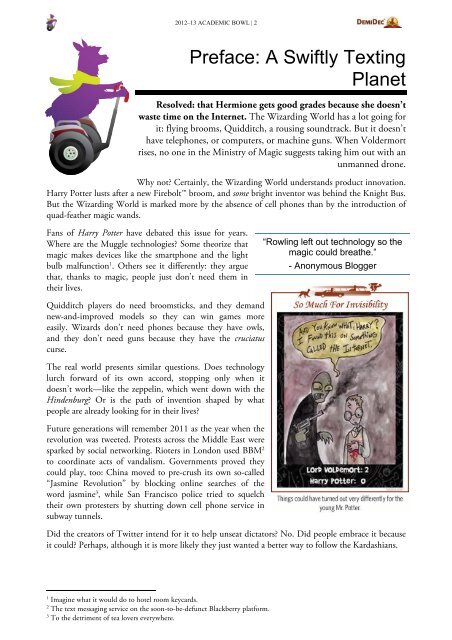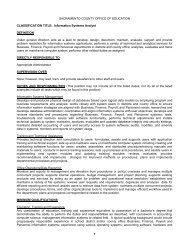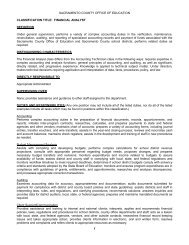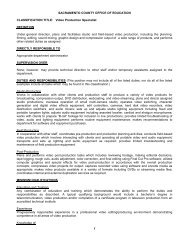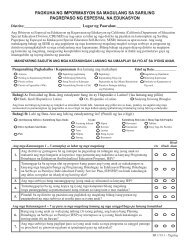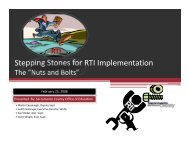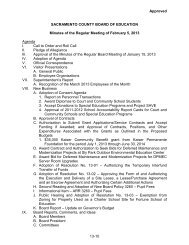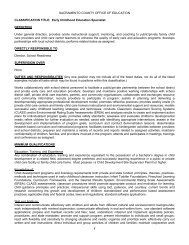You also want an ePaper? Increase the reach of your titles
YUMPU automatically turns print PDFs into web optimized ePapers that Google loves.
2012–13 ACADEMIC BOWL | 2<br />
<strong>Preface</strong>: A Swiftly Texting<br />
Planet<br />
Resolved: that Hermione gets good grades because she doesn’t<br />
waste time on the Internet. The Wizarding World has a lot going for<br />
it: flying brooms, Quidditch, a rousing soundtrack. But it doesn’t<br />
have telephones, or computers, or machine guns. When Voldermort<br />
rises, no one in the Ministry of Magic suggests taking him out with an<br />
unmanned drone.<br />
Why not? Certainly, the Wizarding World understands product innovation.<br />
Harry Potter lusts after a new Firebolt broom, and some bright inventor was behind the Knight Bus.<br />
But the Wizarding World is marked more by the absence of cell phones than by the introduction of<br />
quad-feather magic wands.<br />
Fans of Harry Potter have debated this issue for years.<br />
Where are the Muggle technologies? Some theorize that<br />
magic makes devices like the smartphone and the light<br />
bulb malfunction 1 . Others see it differently: they argue<br />
that, thanks to magic, people just don’t need them in<br />
their lives.<br />
“Rowling left out technology so the<br />
magic could breathe.”<br />
- Anonymous Blogger<br />
Quidditch players do need broomsticks, and they demand<br />
new-and-improved models so they can win games more<br />
easily. Wizards don’t need phones because they have owls,<br />
and they don’t need guns because they have the cruciatus<br />
curse.<br />
The real world presents similar questions. Does technology<br />
lurch forward of its own accord, stopping only when it<br />
doesn’t work—like the zeppelin, which went down with the<br />
Hindenburg? Or is the path of invention shaped by what<br />
people are already looking for in their lives?<br />
Future generations will remember 2011 as the year when the<br />
revolution was tweeted. Protests across the Middle East were<br />
sparked by social networking. Rioters in London used BBM 2<br />
to coordinate acts of vandalism. Governments proved they<br />
could play, too: China moved to pre-crush its own so-called<br />
“Jasmine Revolution” by blocking online searches of the<br />
word jasmine 3 , while San Francisco police tried to squelch<br />
their own protesters by shutting down cell phone service in<br />
subway tunnels.<br />
Did the creators of Twitter intend for it to help unseat dictators? No. Did people embrace it because<br />
it could? Perhaps, although it is more likely they just wanted a better way to follow the Kardashians.<br />
1<br />
Imagine what it would do to hotel room keycards.<br />
2<br />
The text messaging service on the soon-to-be-defunct Blackberry platform.<br />
3<br />
To the detriment of tea lovers everywhere.
2012–13 ACADEMIC BOWL | 3<br />
Mark Zuckerberg devised Facebook because people already wanted to know more about their friends<br />
and classmates 4 . Facebook was a compelling new solution to an old problem. When Steve Jobs<br />
announced the iPad in 2010, many analysts went “meh.” People, they said, didn’t need tablets—they<br />
already had phones and laptops. Yet in two years Apple has sold over 60 million 5 .<br />
In recent years researchers have probed the tangled<br />
relationship between the tools we create, the world we live<br />
in, and the people we become. These scholars of science,<br />
technology, and society go beyond empty generalizations—<br />
“The Internet changed everything!” They pose deeper<br />
questions. Why did the wheel, so popular in Asia and the<br />
Middle East, never take off 6 in the early Americas? 7 Does<br />
growing up in front of a computer affect the way a person<br />
views the world? How is it possible that, in the year 2012 8 ,<br />
no one is commuting to school by jetpack or sharing<br />
adventures with a wisecracking robot pal?<br />
Addressing these questions means taking a closer look at<br />
who shapes the inventions we use and at the conditions that help bring them about. It means<br />
examining the technologies that have transformed our world and asking how much each was a<br />
response to social changes and how much it contributed to those changes. It also means looking at<br />
certain inventions we were told would revolutionize our lives—the Segway! Smell-O-Vision!<br />
Microsoft Bob!—and figuring out why they never did.<br />
4<br />
Or stalk them.<br />
5<br />
Meh, indeed.<br />
6<br />
Or roll off, technically.<br />
7<br />
As opposed to the 1970s Scottish folk/rock band Stealers Wheel, which never caught on anywhere.<br />
8<br />
Eleven years since the Space Odyssey! We’ve got some catching up to do.


